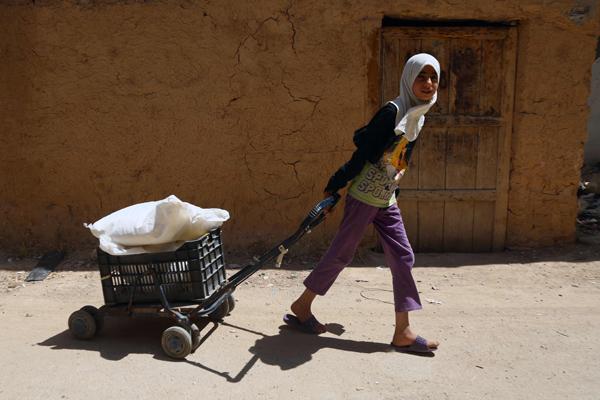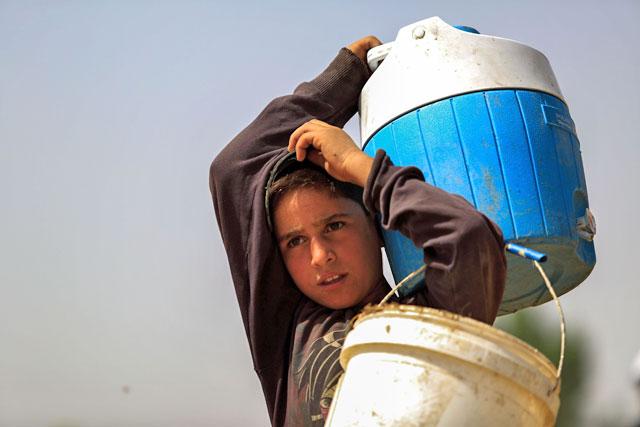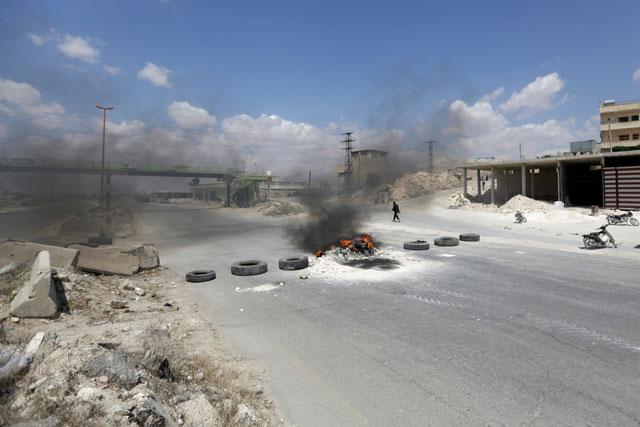You are here
Aid convoy to Syria's besieged Daraya refused entry — Red Cross
By AFP - May 12,2016 - Last updated at May 12,2016

A Syrian girl pulls a cart after receiving from the local council aid parcels provided by the UN World Food Programme and the Syrian Arab Red Crescent on Wednesday, in the rebel-held village of Saqba, on the eastern outskirts of the capital Damascus (AFP photo)
DAMASCUS — An aid convoy was refused entry to Syria's Daraya Thursday, the Red Cross said, dashing hopes for the first such delivery since regime forces began a siege of the rebel-held town in 2012.
A truce in Syria's battle-ground city Aleppo expired, meanwhile, with no new last-minute prolongation after it had been extended twice through last-minute intervention by Moscow and Washington.
World powers are to meet in Vienna next week to try to push faltering peace talks towards ending a five-year conflict that has killed more than 270,000 people.
In the Damascus region, an aid convoy was refused entry to Daraya, which has been besieged by government forces since November 2012.
"We urge the responsible authorities to grant us access to Daraya, so we can return with desperately needed food and medicines" outside the capital, said the International Committee of the Red Cross.
A five-truck convoy organised by the ICRC, the United Nations and the Syrian Arab Red Crescent had been due to deliver baby milk and medical and school supplies.
"Beyond allowing this initial convoy through, the ICRC and its partners need concerned authorities to let it provide other essentials such as food," said the ICRC.
A UN spokesman said it had decided not to go ahead with the convoy after "nutrition items" were removed from the convoy.
UN envoy Staffan de Mistura and the resident humanitarian coordinator had "decided to abort the mission to Daraya because of the removal of nutrition items for children other than vaccines from the UN convoy at the last checkpoint", said Stephane Dujarric.
One civilian died in regime shelling in Daraya on Thursday afternoon, said the Syrian Observatory for Human Rights.
In the northern city of Aleppo, emergency workers reported no deaths in eastern rebel-held areas since the local truce expired on Wednesday night.
But two civilians including a woman died in sniper fire on the divided city's regime-controlled west, said the Observatory.
That truce came after a spike in violence that killed more than 300 civilians on both sides of the city last month.
The meeting next Tuesday between world powers in Austria comes as extremists have dealt a series of setbacks to President Bashar Assad's troops in the country's centre.
In Hama province, Syria's Al Qaeda affiliate — Al Nusra Front — and its allies Thursday captured Zara village, where most residents hail from the same offshoot of Shiite Islam as the president, the Observatory said.
In nearby Homs, also central Syria, fighting has raged near the Shaer gas field — one of the biggest in the province — after the Daesh terror group seized it from the regime last week.
Daesh also cut a main regime supply road between Palmyra and Homs on Tuesday, just weeks after the regime recaptured the historic city.
Stalling peace talks
Assad's troops retook Palmyra with support from Russian air strikes on March 27 — an achievement his regime celebrated with concerts in its ancient amphitheatre last week.
Al Nusra and Daesh are not included in a fragile nationwide ceasefire between the regime and non-extremist rebels implemented in late February to set the ground for peace talks.
The last round of peace talks in Geneva reached a deadlock in April when the main opposition group suspended its participation over mounting violence and lack of humanitarian access.
Talks have also faltered over the fate of Assad, with the opposition insisting any peace deal must include his departure. But Damascus says his future is non-negotiable.
The head of Syria's main opposition group taking part in negotiations has told AFP forces fighting the regime need "actions, not words" from countries that support them.
"What we want are practical and effective measures on the ground. We don't need statements or pretty words in the media because that doesn't produce any results," said Riad Hijab.
He called for tougher action against Assad, who he claimed had effectively received a "green light" from Moscow and Washington to continue bombing civilian areas.
Millions have fled Syria's conflict since it started with anti-government protests in 2011.
These include 20 per cent of Syria's Palestinian refugees, the head of the UN Palestinian refugee agency said Thursday.
Before the war, Syria was home to about 560,000 Palestinians whose ancestors fled the 1948 creation of Israel on Palestinian land and ensuing conflicts.
Related Articles
GENEVA — The United Nations is still waiting for Syrian government agreement for an aid convoy to enter the besieged town of Daraya, UN offi
GENEVA — The United Nations will take the "last resort" option of air drops of humanitarian aid if access to besieged areas in Syria is not
WASHINGTON — The United States said it was not discussing joint air strikes with Russia on Monday and called on Moscow to press Syrian Presi













